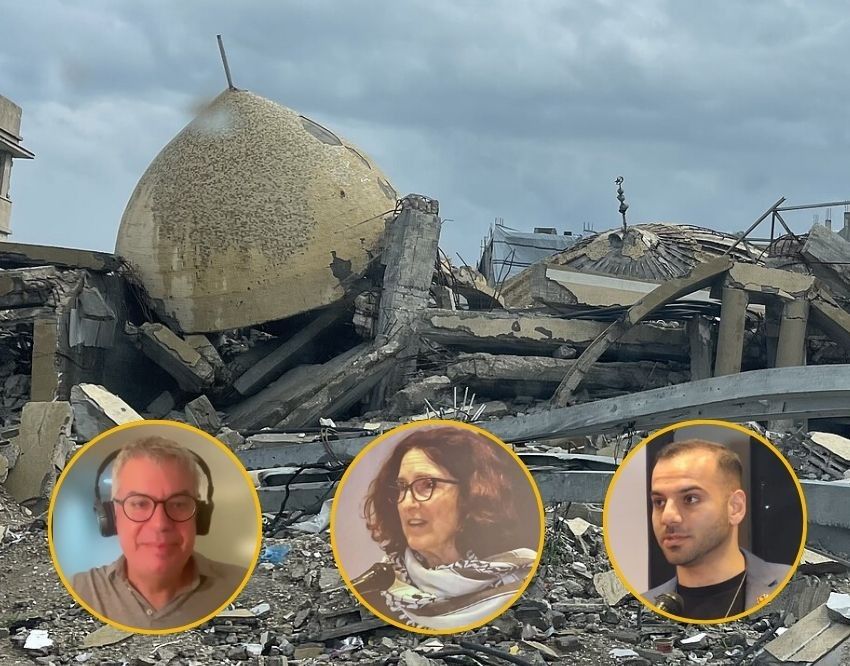
In the context of Israel’s ramped-up genocide against Palestinians in Gaza and the West Bank, the Ecosocialism 2025 conference featured three speakers discussing Palestine and the global movement against Zionism.
Adam Hanieh — professor of political economy and global development at the University of Exeter who completed a Master of Arts at Al-Quds University in Palestine — provided a comprehensive analysis linking the ongoing genocide in Gaza to global imperialism and the climate crisis, framing Palestine as central to understanding the ecosocialist struggle.
Hanieh, author of Crude Capitalism and co-author of Resisting Erasure, said narrowly framing Palestine as a human rights issue, or attributing Western support primarily to pro-Israel lobbies, is misleading and depoliticises the struggle.
Instead, he said, Palestine must be understood in the context of broader Middle East regional dynamics and global capitalism.
The shift from coal to oil as the dominant fossil fuel and the rise of the oil-dependent United States as the dominant global capitalist power in the mid-20th century are why the West sees Israel as critical to its interests in the Middle East, Hanieh said.
Settler colonies, like Israel, “must always fortify structures of racial oppression, class exploitation and dispossession of the Indigenous populations”, Hanieh said. “They are typically highly racist, violent societies … which tend to be reliant upon external support to maintain privileges in a hostile regional environment.”
The Gulf states and Israel are pillars of US power in the region, Hanieh said.
US policy over the past few decades, continued by Trump, is “an attempt to reassert American primacy in the Middle East through normalising relationships between Israel and the Gulf states … this would be very important in the context of any heightened conflict with China.”
Israel, as a settler-colonial state, serves Western imperial interests by suppressing anti-colonial movements in the region, in a role historically analogous to Apartheid South Africa.
Palestine is “truly a climate issue”, Hanieh said, due to the region’s role in global fossil fuel production and the US’ unwavering support for Israel being tied to maintaining control over this critical energy hub.
“Palestine is a climate issue because the Middle East sits at the centre of our global oil economy. It is therefore a key element to American power and this is why the US continues to support and wage the genocide in Palestine.”
Amin G Abbas — son and grandson of Palestinian refugees from Jenin and Tiberias, and Australian Palestine Advocacy Network executive member — also stressed the intersection of capitalism and colonialism.
"Palestine is not just a political question; it is an economic one,” he said. “It shows us that capital moves when morality is on the line. Capitalism rewards profit, not principle. It incentivises investment, not integrity; Palestine exposes this very brutal truth.”
Abbas detailed the complicity of global corporations in supporting Israel’s genocide, noting that the value of Israel’s stock exchange has doubled since October 2023. Corporations profit from markets generated on stolen land, he said.
Popular movements — such as boycotts of McDonald’s and Starbucks in the Middle East, and student activism worldwide — demonstrate the potential of grassroots pressure to challenge corporate complicity, Abbas said.
Janet Parker, a founding member of Jews for Palestine WA and member of the Socialist Alliance, said Israel is a settler-colonial state akin to so-called Australia’s colonial history.
She said the Zionist slogan, “a land without people for a people without a land”, echoes the British colonialist declaration of terra nullius used to justify the genocidal takeover of Aboriginal land in Australia.
Parker outlined the forced displacement of millions of Palestinians through the colonial seizure of more than 78% of historic Palestine.
Since October 2023, she said, Israel has implemented the second Nakba (catastrophe) — “a campaign of ethnic cleansing carried out with a savage hate that simultaneously seeks to denigrate and dehumanise an entire people to justify its brutality”.
“For many decades now, both Israel and its supporters have exploited Jewish fears about persecution and Western guilt about the Holocaust, to weaponise them against Palestinians,” Parker said. “This has had huge impact on Western public opinion, shielded Israel from scrutiny and given it a free pass to break international law.”
While antisemitism is a real problem, Parker said, exceptionalising Jews and smearing legitimate criticism of Israel as antisemitic makes the problem worse.
She said that Israeli media, particularly under Prime Minister Benjamin Netanyahu’s influence, has become an ideological weapon promoting genocidal rhetoric and normalising violence and hate against Palestinians.
All the speakers noted that, since October 2023, the world has witnessed the largest, sustained global movement for Palestine in history, but stressed the need to broaden it further if it is to stop Israel.
Parker called for a much stronger trade union movement to halt exports to Israel. Hanieh said the movement for Palestine represents the “leading edge of deeper radicalisation”, which is why governments like Australia and Britain are increasingly repressing it.
[Watch the full livestream of this panel at Ecosocialism 2025 here.]